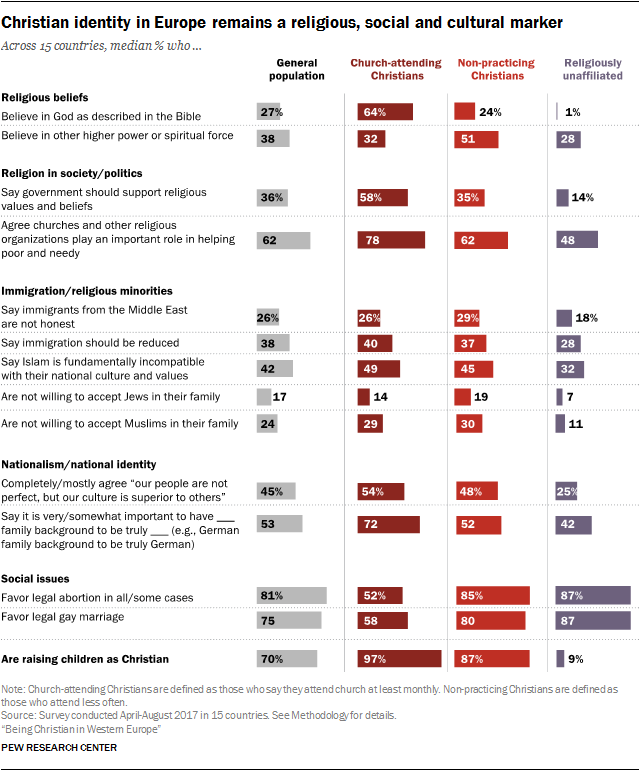The figures you find in #1 raise some obvious
questions:
- What is the meaning of Christian identity in Western Europe today?
- And how different are non-practicing Christians from religiously unaffiliated Europeans – many of whom also come from Christian backgrounds?
The Pew Research Center study – which
involved more than 24,000 telephone interviews with randomly selected
adults, including nearly 12,000 non-practicing Christians – finds that
Christian identity remains a meaningful marker in Western Europe, even
among those who seldom go to church. It is not just a “nominal”
identity devoid of practical importance. On the contrary, the
religious, political and cultural views of non-practicing Christians
often differ from those of church-attending Christians and religiously unaffiliated adults. For example:
- Although many non-practicing Christians say they do not believe in God “as described in the Bible,” they do tend to believe in some other higher power or spiritual force. By contrast, most church-attending Christians say they believe in the biblical depiction of God, though of most of them we do know they believe in the human doctrinal god, namely the trinity. And a clear majority of religiously unaffiliated adults do not believe in any type of higher power or spiritual force in the universe.
- Non-practicing Christians tend to express more positive than negative views toward churches and religious organizations, saying they serve society by helping the poor and bringing communities together. Their attitudes toward religious institutions are not quite as favourable as those of church-attending Christians, but they are more likely than religiously unaffiliated Europeans to say churches and other religious organizations contribute positively to society.
- Christian identity in Western Europe is associated with higher levels of negative sentiment toward immigrants and religious minorities. On balance, self-identified Christians – whether they attend church or not – are more likely than religiously unaffiliated people to express negative views of immigrants, as well as of Muslims and Jews.
- Non-practicing Christians are less likely than church-attending Christians to express nationalist views. Still, they are more likely than “nones” to say that their culture is superior to others and that it is necessary to have the country’s ancestry to share the national identity (e.g., one must have Spanish family background to be truly Spanish).
- The vast majority of non-practicing Christians, like the vast majority of the unaffiliated in Western Europe, favour legal abortion and same-sex marriage. Church-attending Christians are more conservative on these issues, though even among churchgoing Christians, there is substantial support – and in several countries, majority support – for legal abortion and same-sex marriage.
- Nearly all churchgoing Christians who are parents or guardians of minor children (those under 18) say they are raising those children in the Christian faith. Among non-practicing Christians, somewhat fewer – though still the overwhelming majority – say they are bringing up their children as Christians. By contrast, religiously unaffiliated parents generally are raising their children with no religion.

Religious identity and practice are not the only factors behind Europeans’ beliefs and opinions on these issues. For instance, highly educated Europeans are generally more accepting of immigrants and religious minorities, and religiously unaffiliated adults tend to have more years of schooling than non-practicing Christians. But even after statistical techniques are used to control for differences in education, age, gender and political ideology, the survey shows that churchgoing Christians, non-practicing Christians and unaffiliated Europeans express different religious, cultural and social attitudes. (See below in this overview and Chapter 1.)
These are among the key findings of a new Pew Research Center survey of 24,599 randomly selected adults across 15 countries in Western Europe. Interviews were conducted on mobile and landline telephones from April to August, 2017, in 12 languages. The survey examines not just traditional Christian religious beliefs and behaviours, opinions about the role of religious institutions in society, and views on national identity, immigrants and religious minorities, but also Europeans’ attitudes toward Eastern and New Age spiritual ideas and practices. And the second half of this Overview more closely examines the beliefs and other characteristics of the religiously unaffiliated population in the region.
While the vast majority of Western
Europeans identify as either Christian or religiously unaffiliated, the
survey also includes interviews with people of other (non-Christian)
religions as well as with some who decline to answer questions about
their religious identity. But, in most countries, the survey’s sample
sizes do not allow for a detailed analysis of the attitudes of people in
this group. Furthermore, this category is composed largely of Muslim
respondents, and general population surveys may underrepresent Muslims
and other small religious groups in Europe because these minority
populations often are distributed differently throughout the country
than is the general population; additionally, some members of these
groups (especially recent immigrants) do not speak the national language
well enough to participate in a survey. As a result, this report does
not attempt to characterize the views of religious minorities such as
Muslims, Jews, Buddhists or Hindus in Western Europe.






